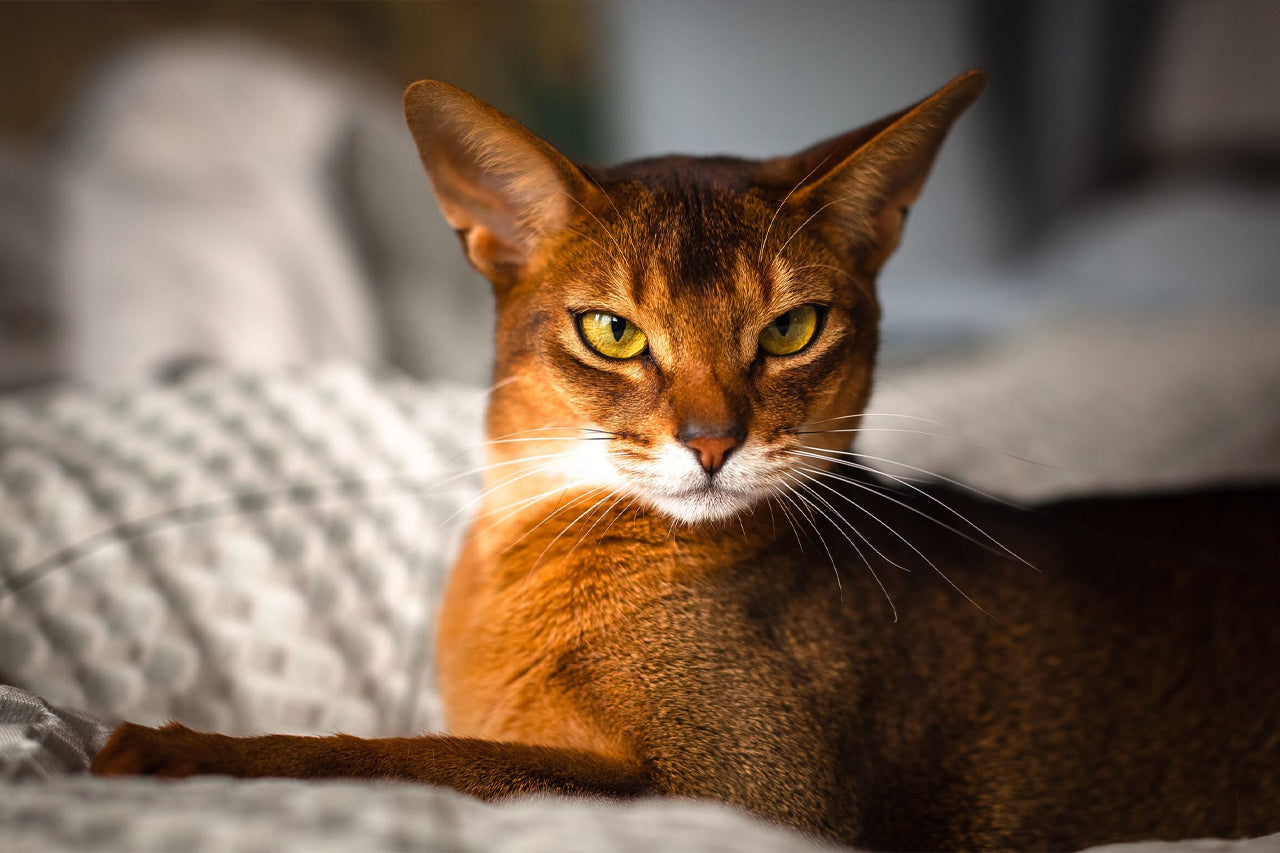
Abyssinian Cat Breed Guide
Summary
- The Abyssinian is among the oldest domesticated cat breeds, with roots possibly tracing back to ancient Egypt.
- Recognized for its athletic build and ticked coat, this breed is admired for both appearance and agility.
- Intelligent, curious, and playful, Abyssinians require high mental and physical stimulation.
- The breed is relatively low-maintenance in grooming but needs an enriched environment to thrive.
-
Potential health concerns include genetic conditions like PRA and PK deficiency, requiring regular vet care.
The Abyssinian is a medium-sized cat breed known for its high energy, intelligence, and unique coat pattern. Often considered one of the oldest domesticated cat breeds, it has a long history and a reputation for being active and people-oriented. This guide covers everything potential cat owners need to know, including the breed’s origin, appearance, behavior, care needs, and common health issues.
Where Do Abyssinian Cats Come From?
The Abyssinian cat breed has a history as fascinating as its appearance. It is widely considered one of the oldest domesticated cat breeds.
Origins
The exact origin of the Abyssinian is subject to debate. While commonly believed to descend from Abyssinia (modern-day Ethiopia), some genetic studies suggest links to the Indian Ocean coastal regions and parts of Southeast Asia. The breed gained recognition in the United Kingdom after British soldiers brought cats back from Abyssinia in the 19th century. Its resemblance to cats depicted in ancient Egyptian artifacts has led many to associate the breed with Egypt's sacred felines.
Physical Characteristics
Abyssinians possess a lean, muscular build that emphasizes grace and agility. Males typically weigh between 8 and 12 pounds, with females slightly smaller.
Head and Ears: Moderately wedge-shaped head paired with large, expressive ears that often feature small tufts.
Eyes: Almond-shaped and striking in shades of gold, green, or hazel.
Coat: Characterized by a ticked or agouti pattern, where each hair features multiple bands of color. The coat is short, fine, and dense, offering a shimmering effect.
Colors: Ruddy, cinnamon, blue, fawn, chocolate, lilac, and their silver variants.
Tail: Long, slender, and tapering, balancing the breed’s athletic physique.
Abyssinian Personality & Temperament
Known for their lively disposition, Abyssinians offer companionship marked by intelligence and affection. Their behaviors reflect a deep need for engagement, both mental and physical.
Behavioral Traits
Abyssinians maintain a high energy level throughout their lives and are often referred to as eternal kittens. Their inquisitive nature leads them to explore their environment actively. They tend to form strong bonds with their human families and enjoy games that involve interaction, such as fetch or puzzle-solving. Many can also be trained to walk on a leash.
Ideal Home Environment
The breed is best suited to households that can accommodate its need for activity. Vertical spaces such as cat trees and wall shelves provide the climbing opportunities Abyssinians crave. While they are generally sociable with children and other pets, they are not an ideal choice for those looking for a calm, sedentary companion.
What are Abyssinian Cat’s Care Requirements?
Proper care for an Abyssinian involves more than grooming; it also includes regular enrichment and nutritional support.
Grooming Needs
Thanks to their short, dense coats, Abyssinians are relatively easy to maintain. A weekly brushing session is sufficient to remove loose hairs and keep their coat in optimal condition. Regular ear cleaning and nail trimming are recommended.
Exercise & Enrichment
This breed requires daily physical activity and mental stimulation. Lack of enrichment can lead to destructive behavior.
- Climbing structures and interactive toys are essential.
- Puzzle feeders can stimulate their minds during mealtime.
-
Leash training may provide a safe way to explore outdoors.
Diet & Nutrition
Abyssinians benefit from a protein-rich diet to support their high energy levels. Nutritional plans should be tailored based on the cat’s age, activity level, and health status. A combination of wet and dry food helps maintain hydration and dental health. According to the American Veterinary Medical Association, more than 70% of cats show signs of dental disease by the age of three, highlighting the importance of proactive care.
What are the Common Health Issues?
Although generally healthy, the Abyssinian cat breed is genetically predisposed to certain conditions that require awareness and preventative care.
Genetic Conditions
- Progressive Retinal Atrophy (PRA): Leads to vision deterioration over time.
- Pyruvate Kinase Deficiency (PKD): Affects red blood cell function, potentially causing anemia.
- Amyloidosis: Results from abnormal protein deposits, often affecting the kidneys.
-
Patellar Luxation: Involves the dislocation of the kneecap, which may impact mobility.
Preventative Care
Routine veterinary visits are essential. Annual checkups, dental cleanings, vaccinations, and parasite control contribute to long-term health and early detection of issues.
Average Lifespan
Abyssinians typically live between 09 and 15 years, although some may live longer with attentive care and a balanced diet.
Final Verdict
The Abyssinian cat breed represents a unique combination of beauty, intelligence, and vitality. With their captivating appearance and lively nature, they are well-suited to pet owners who can meet their need for attention, stimulation, and care. Their grooming requirements are minimal, but their emotional and physical needs are considerable. For those prepared to engage with them fully, Abyssinians offer a rewarding companionship that brings vibrancy to everyday life.
Frequently Asked Questions
Are Abyssinians hypoallergenic?
No. Although they may shed less than some other breeds, Abyssinians still produce allergens.
Do Abyssinians like water?
Yes, Abyssinians are known for their unusual fondness for water and often show fascination with it, sometimes even playing with water bowls or faucets.
How vocal are Abyssinians?
They are moderately vocal and tend to communicate with soft, chirpy sounds rather than loud meows.




























